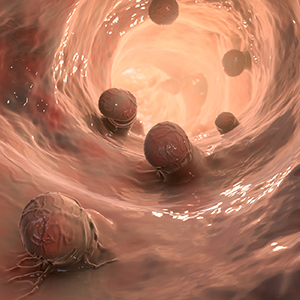What Are the Warning Signs of Colorectal Cancer?

Colorectal cancer is a leading cause of cancer-related death in the U.S., and cases of early-onset colorectal cancer (diagnosis before age 50) continue to rise annually. If you're under age 50, your chances of being diagnosed have increased by 50% over the last three decades.
In rural communities like Northern Michigan, people are 15 to 20% more likely to be impacted by this type of cancer. The majority of cases (about 60%*) aren't detected until late stages, which increases risk of death from this disease. The 5-year survival relative survival rate for localized colorectal cancer (stage 1 or 2) is approximately 90% compared to 14% for stage 4 colorectal cancer, according to The American Cancer Society.
The good news is that colorectal cancer can be caught early and even prevented through screening. Read on to learn more, including risk factors and preventive tips that keep colorectal cancer from developing or spreading.
*(Source: Michigan Department of Health and Human Services – Antrim, Benzie, Grand Traverse, Kalkaska, and Leelanau counties).
In this blog:
- What is colorectal cancer?
- What causes colorectal cancer?
- Colorectal cancer warning signs
- Preventing colorectal cancer
- Treating colorectal cancer
- When you should schedule your screening
What is colorectal cancer?

Colorectal cancer is cancer that starts in either your colon or your rectum. In most cases, cancer doesn't start in both places. But colon and rectum cancer have a lot in common, so they're often called colorectal cancer.
Together, the colon and rectum make up the large intestine. Like your other organs, the large intestine is lined with millions of cells. Changes in these cells can lead to abnormal growths (a.k.a polyps).
Polyps can be benign (not harmful), pre-cancerous, or malignant (cancerous). Most polyps are not harmful, but certain types are at high risk of developing into cancer. Colon cancer spreads when a polyp becomes cancerous, and the cells grow into the colon's walls.
What causes colorectal cancer?
Like many other types of cancer, there is no single cause of colorectal cancer. But there are certain risk factors that increase your risk of developing it:

- Smoking and excessive alcohol consumption
- Poor diet (low in fiber, high in processed foods)
- A family history of colorectal cancer or polyps
- Genetic factors
- Age (Being age 45+ increases your risk)
- Weight (obese men have a 50% higher chance of colon cancer and a 25% higher chance of rectal cancer, for example)
- Gender (rectal cancer rates are higher in men)
- Certain health conditions (like Crohn’s, ulcerative colitis, and type 2 diabetes)
About 55% of colorectal cancer diagnoses in the US are linked to lifestyle choices, such as our diet, alcohol and cigarette consumption, activity levels, and weight, according to the American Cancer Society.
What Are the Warning Signs of Colorectal Cancer?
Watch this special episode of Munson Minutes to understand the warning signs:
Other non-cancerous conditions may cause these signs, so it's important to see a gastroenterologist and undergo routine screenings.
Preventing Colorectal Cancer
A healthy lifestyle can help decrease your risk of colorectal cancer. Things like maintaining a healthy weight (especially around your abdomen), living smoke-free, monitoring your sugar and alcohol intake, exercising regularly, and enjoying a fiber-rich diet can help reduce your risk.

But perhaps the biggest factor in preventing complications from this disease is routine screening – especially if you’re over age 45 or you have a family history of colorectal cancer. While your doctor can prescribe stool-based screening, a colonoscopy is the most comprehensive type of screening since it allows a thorough examination of the entire colon.
Screening can help detect colorectal cancer early before it grows and spreads. Regular screening can also prevent colorectal cancer because doctors can locate and remove polyps before they become cancerous, which can take up to 15 years.
Some people prolong or avoid screening because it involves a liquid laxative, sedation, and taking a day off from work. Fortunately, the preparation methods for colonoscopies have improved over time, and you typically only need one colonoscopy per decade if no cancer is found. You can also discuss alternative types of screening with your doctor or gastroenterologist.
Treating Colorectal Cancer
Treatment varies depending on whether the cancer is in the colon or in the rectum. Surgery is typically required to remove colon cancer – and chemotherapy and other targeted therapies may be needed, especially if it has spread to other organs, such as your liver, ovaries, or lungs. Rectal cancer, on the other hand, is usually treated with systemic therapy and radiation followed by surgery if needed. Munson Healthcare offers advanced screening tools, state-of-the-art treatment options, and a coordinated care approach to support our patients at every step.
Get Screened Today
Talk with your primary care provider about getting screened at your next annual wellness. If you’re over 45 years old or at higher risk due to certain factors like family history, your insurance often covers up to all of your screening costs.
Questions?
If you have questions about colorectal cancer, be sure to ask your healthcare provider during your next visit. Your trusted primary care provider can help you understand more about this cancer, including your best options for screening and prevention.
Looking for a primary care provider? Use Munson Healthcare’s Find A Doctor by visiting munsonhealthcare.org/find-a-doctor or call our Ask-A-Nurse line at 231-935-0951.